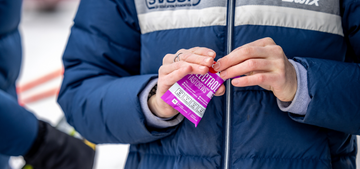
At SaltStick, we are proud to sponsor top athletes in the fields of triathlon, running, tennis and more. We are inspired by our athletes and admire the hard work and time they have dedicated to achieving success.
Because we hope our athletes’ performances will serve as motivation as you pursue your own fitness journey, we enjoy sharing their stories. This week’s blog post features professional tennis player Jason Jung, who reminds us that athletic success often comes down to just putting in the hours.
With a tough competition schedule, Jason is a world-class professional tennis player, and his achievements include a career high singles ranking: of #194 in the world, and showings at the French Open, Wimbledon, and U.S. Open.
For other athletes’ stories, visit any of the blog posts below:
Jason’s journey into tennis:
Jason has a deep history in the sport of tennis, dating back to when he was just four years old. “ I grew up at a tennis club so tennis was constantly around me,” he says. Early on, this exposure taught him that if he wanted to succeed, he had to put in the work. After several years of training, he began to show success as a teen.
https://www.instagram.com/p/rioc5klITj/
The dream, he says, was always to become a professional tennis player. During his teenage years, Jason’s involvement with tennis took him all over the world to compete in junior championships. However, it wasn’t until after his time playing tennis for the University of Michigan that he decided to take the leap and go after his professional career.
Since then, Jason has competed on some of the biggest stages of the sport, including the French Open, Wimbledon and the U.S. Open. His career-high singles ranking is No. 194 in the world, and today, Jason continues to live out his dream as a professional athlete.
“I love this sport,” Jason says. “There are so many ups and downs, but this journey has constantly been challenging me and pushing me to be at my best.”
On training:
“I’ve been surprised over the years at how tennis has gotten so complex,” Jason says. “All players want to maximize their potentials so players are seeking out the best mental coaches, nutritionist and tennis coaches. It’s constantly pushing players to evolve so much quicker.”
Training as a professional tennis player is relentless, and even Jason’s “off” weeks are tough and include workouts that focus on strength, flexibility, explosiveness and endurance. Like endurance athletes, Jason’s training is cyclical, timed around when he needs to be in top form for a competition. .
“It depends on how many weeks I have before the next tournament,” he says. “For example, if I only have one week off I generally keep it light and just maintain my strength and endurance. If I have more than one week I can push my body a little bit more and create more of a plan.”
One of the most important aspects of training is technique, which means Jason spends a lot of time repeating drills to improve his body’s muscle memory. He describes these days as “hitting the same shot over and over … a lot of side to side and up and down movements.”
On motivation:
Jason is able to cope with this high level of training because he’s motivated by a desire to prove naysayers wrong.
https://www.instagram.com/p/pBlh7BFIR-/
“A lot of people throughout my career have doubted my abilities,” he says. “Said I didn’t have the skills to reach it to the top. I want to prove those people wrong. That makes me hungry and motivated.”
He admits that like all athletes, he has the occasional off day. His solution is usually to take a mental break to keep his mind fresh. Tennis, while taxing physically, is also mentally difficult, as players must be able to maintain intense focus in front of crowds, during matches that can last several hours. Also, as anyone who has performed tennis drills can attest, it takes a certain mental toughness to outlast the boredom of technique days.
On nutrition:
Jason aims to be generally healthy in his approach to diet and nutrition. It’s difficult for him to put on or maintain weight, so he focuses on avoiding unhealthy foods, such as sugar, dairy and fried foods, and aims instead for for simple dishes made with natural ingredients.
“I don’t want to go too crazy with nutritional diets,” he says. “Sometimes it’s tough, but I think I do a pretty good job.”
His favorite post-workout meal is some type of Mediterranean dish, because “you have your veggies, proteins and carbohydrates.”
How SaltStick helps Jason perform:
Jason, who is a high sweater, uses SaltStick to help replenish electrolytes lost during training and competition. Five electrolytes in particular play a pivotal role in maintaining normal human muscle function: sodium, potassium, magnesium, calcium, and chloride. A shortage of any of these electrolytes will affect athletic performance through a range a subtle to serious side effects.
Cramping is a common side effect of low electrolyte levels in tennis players. To help avoid this, Jason is sure to take SaltStick Caps both before and after a tennis match, and depending on how hot it is outside, he adjusts his additional intake during the match.
“SaltStick has definitely improved my performance on court,” he says “I’m able to train harder and recover faster because I’m able to replenish lost electrolytes.”
https://twitter.com/jasonjungtennis/status/500830205234413568
Jason’s advice to new tennis players:
Jason’s advice to athletes just starting out in the sport of tennis is to focus on technique. A lot.
“My one advice for beginners is try your best to seek out the right technique with your tennis strokes. It’s so important to have good technique because it will help you grow that much faster. And you don’t get into as many bad habits.”
Thank you, Jason!

 At SaltStick, we are proud to sponsor top athletes in the fields of triathlon, running, tennis and more. We are inspired by our athletes and admire the hard work and time they have dedicated to achieving success.
Because we hope our athletes’ performances will serve as motivation as you pursue your own fitness journey, we enjoy sharing their stories. This week’s blog post features professional tennis player Jason Jung, who reminds us that athletic success often comes down to just putting in the hours.
With a tough competition schedule, Jason is a world-class professional tennis player, and his achievements include a career high singles ranking: of #194 in the world, and showings at the French Open, Wimbledon, and U.S. Open.
For other athletes’ stories, visit any of the blog posts below:
At SaltStick, we are proud to sponsor top athletes in the fields of triathlon, running, tennis and more. We are inspired by our athletes and admire the hard work and time they have dedicated to achieving success.
Because we hope our athletes’ performances will serve as motivation as you pursue your own fitness journey, we enjoy sharing their stories. This week’s blog post features professional tennis player Jason Jung, who reminds us that athletic success often comes down to just putting in the hours.
With a tough competition schedule, Jason is a world-class professional tennis player, and his achievements include a career high singles ranking: of #194 in the world, and showings at the French Open, Wimbledon, and U.S. Open.
For other athletes’ stories, visit any of the blog posts below:








